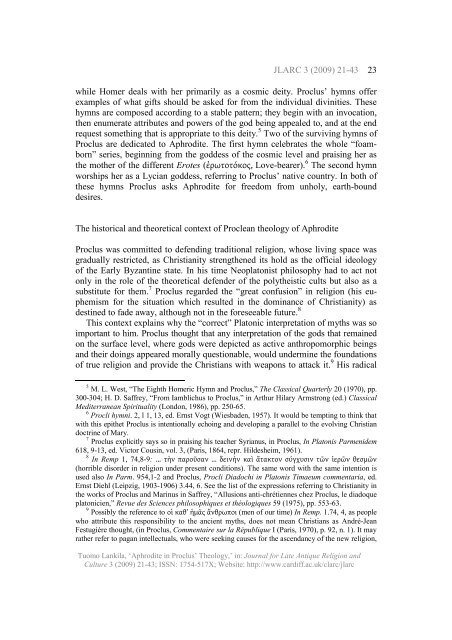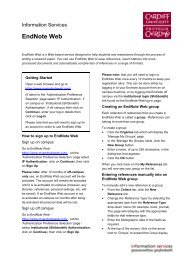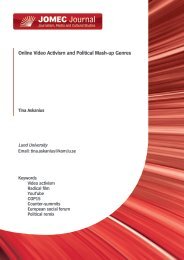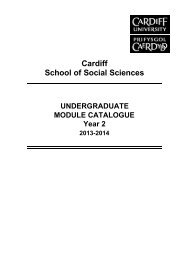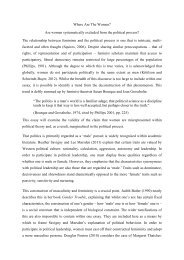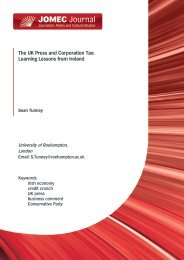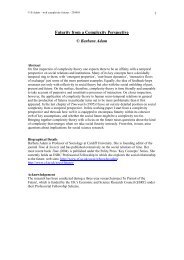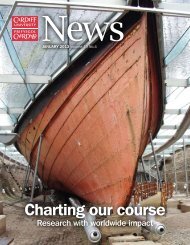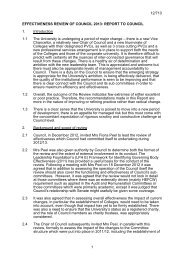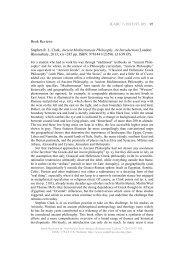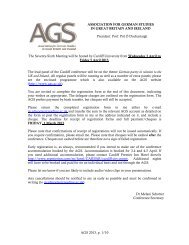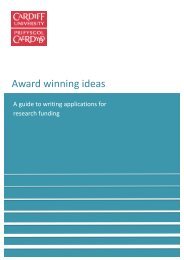APHRODITE IN PROCLUS' THEOLOGY - Cardiff University
APHRODITE IN PROCLUS' THEOLOGY - Cardiff University
APHRODITE IN PROCLUS' THEOLOGY - Cardiff University
You also want an ePaper? Increase the reach of your titles
YUMPU automatically turns print PDFs into web optimized ePapers that Google loves.
JLARC 3 (2009) 21-43 23<br />
while Homer deals with her primarily as a cosmic deity. Proclus’ hymns offer<br />
examples of what gifts should be asked for from the individual divinities. These<br />
hymns are composed according to a stable pattern; they begin with an invocation,<br />
then enumerate attributes and powers of the god being appealed to, and at the end<br />
request something that is appropriate to this deity. 5 Two of the surviving hymns of<br />
Proclus are dedicated to Aphrodite. The first hymn celebrates the whole “foamborn”<br />
series, beginning from the goddess of the cosmic level and praising her as<br />
the mother of the different Erotes (ἐρωτοτόκος, Love-bearer). 6 The second hymn<br />
worships her as a Lycian goddess, referring to Proclus’ native country. In both of<br />
these hymns Proclus asks Aphrodite for freedom from unholy, earth-bound<br />
desires.<br />
The historical and theoretical context of Proclean theology of Aphrodite<br />
Proclus was committed to defending traditional religion, whose living space was<br />
gradually restricted, as Christianity strengthened its hold as the official ideology<br />
of the Early Byzantine state. In his time Neoplatonist philosophy had to act not<br />
only in the role of the theoretical defender of the polytheistic cults but also as a<br />
substitute for them. 7 Proclus regarded the “great confusion” in religion (his euphemism<br />
for the situation which resulted in the dominance of Christianity) as<br />
destined to fade away, although not in the foreseeable future. 8<br />
This context explains why the “correct” Platonic interpretation of myths was so<br />
important to him. Proclus thought that any interpretation of the gods that remained<br />
on the surface level, where gods were depicted as active anthropomorphic beings<br />
and their doings appeared morally questionable, would undermine the foundations<br />
of true religion and provide the Christians with weapons to attack it. 9 His radical<br />
5 M. L. West, “The Eighth Homeric Hymn and Proclus,” The Classical Quarterly 20 (1970), pp.<br />
300-304; H. D. Saffrey, “From Iamblichus to Proclus,” in Arthur Hilary Armstrong (ed.) Classical<br />
Mediterranean Spirituality (London, 1986), pp. 250-65.<br />
6 Procli hymni. 2, l 1, 13, ed. Ernst Vogt (Wiesbaden, 1957). It would be tempting to think that<br />
with this epithet Proclus is intentionally echoing and developing a parallel to the evolving Christian<br />
doctrine of Mary.<br />
7 Proclus explicitly says so in praising his teacher Syrianus, in Proclus, In Platonis Parmenidem<br />
618, 9-13, ed. Victor Cousin, vol. 3, (Paris, 1864, repr. Hildesheim, 1961).<br />
8 In Remp 1, 74,8-9: ... τὴν παροῦσαν ... δεινὴν καὶ ἄτακτον σύγχυσιν τῶν ἱερῶν θεσμῶν<br />
(horrible disorder in religion under present conditions). The same word with the same intention is<br />
used also In Parm. 954,1-2 and Proclus, Procli Diadochi in Platonis Timaeum commentaria, ed.<br />
Ernst Diehl (Leipzig, 1903-1906) 3.44, 6. See the list of the expressions referring to Christianity in<br />
the works of Proclus and Marinus in Saffrey, “Allusions anti-chrétiennes chez Proclus, le diadoque<br />
platonicien,” Revue des Sciences philosophiques et théologiques 59 (1975), pp. 553-63.<br />
9 Possibly the reference to οἱ καθ’ ἡμᾶς ἄνθρωποι (men of our time) In Remp. 1.74, 4, as people<br />
who attribute this responsibility to the ancient myths, does not mean Christians as André-Jean<br />
Festugière thought, (in Proclus, Commentaire sur la République I (Paris, 1970), p. 92, n. 1). It may<br />
rather refer to pagan intellectuals, who were seeking causes for the ascendancy of the new religion,<br />
Tuomo Lankila, ‘Aphrodite in Proclus’ Theology,’ in: Journal for Late Antique Religion and<br />
Culture 3 (2009) 21-43; ISSN: 1754-517X; Website: http://www.cardiff.ac.uk/clarc/jlarc


